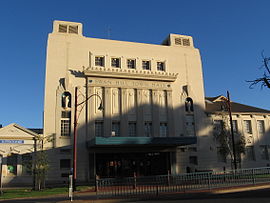The City of Swan Hill was a local government area in northwestern Victoria, Australia, along the Murray River. The city covered an area of 13.66 square kilometres (5.27 sq mi), and existed from 1939 until 1995.
| City of Swan Hill Victoria | |||||||||||||||
|---|---|---|---|---|---|---|---|---|---|---|---|---|---|---|---|
 Location in Victoria | |||||||||||||||
 Swan Hill Town Hall | |||||||||||||||
| Population | 9,750 (1992)[1] | ||||||||||||||
| • Density | 713.8/km2 (1,848.6/sq mi) | ||||||||||||||
| Established | 1939 | ||||||||||||||
| Area | 13.66 km2 (5.3 sq mi) | ||||||||||||||
| Council seat | Swan Hill | ||||||||||||||
| Region | Mallee | ||||||||||||||
| County | Tatchera | ||||||||||||||
| |||||||||||||||
History
editSwan Hill was originally part of the Swan Hill Road District, which initially covered most of northwestern Victoria, and was incorporated in 1862. The Shire of Castle Donnington severed from the district on 30 May 1893, and on 31 May 1904, the Castle Donnington municipality was renamed and gazetted as the Shire of Swan Hill.[2][3]
A small part of the shire, in and near the town of Swan Hill, severed on 31 May 1939, and was incorporated as the Borough of Swan Hill, which became the City of Swan Hill on 12 March 1965.[2]
On 20 January 1995, the City of Swan Hill was abolished, and along with the Shire of Swan Hill and the Tresco district of the Shire of Kerang, was merged into the newly created Rural City of Swan Hill.[4]
Wards
editSwan Hill was not divided into wards, and its nine councillors represented all electors in the city.
Population
edit| Year | Population |
|---|---|
| 1954 | 5,197 |
| 1958 | 5,930* |
| 1961 | 6,186 |
| 1966 | 7,376 |
| 1971 | 7,712 |
| 1976 | 7,857 |
| 1981 | 8,398 |
| 1986 | 8,907 |
| 1991 | 9,357 |
* Estimate in the 1958 Victorian Year Book.
References
edit- ^ Australian Bureau of Statistics, Victoria Office (1994). Victorian Year Book. p. 51. ISSN 0067-1223.
- ^ a b Victorian Municipal Directory. Brunswick: Arnall & Jackson. 1992. pp. 506–507, 718–720, 846–847. Accessed at State Library of Victoria, La Trobe Reading Room.
- ^ Public Record Office Victoria (2005). "Agency VA 4385". Retrieved 8 January 2008.
- ^ Australian Bureau of Statistics (1 August 1995). Victorian local government amalgamations 1994-1995: Changes to the Australian Standard Geographical Classification (PDF). Commonwealth of Australia. p. 11. ISBN 0-642-23117-6. Retrieved 5 January 2008.